Prostate Cancer Treatment in Bangalore
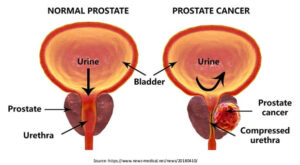
The prostate serves a variety of functions. Some of its roles include producing the fluid that nourishes and carries sperm, secreting prostate-specific antigen (PSA), a protein that helps semen retain its liquid condition, and assisting with urine control.
Prostate cancer is a common type of cancer in males. It originates in the prostate gland, located between the penis and the bladder. It is highly curable in its early phases.
Whether you have been diagnosed with early-stage prostate cancer, your cancer has returned after treatment, or you have a more advanced condition, you have more alternatives than ever before.
Dr. Sandeep Nayak, one of the best oncologist in Bangalore, India, can help you select which treatments will give you the best chance of controlling or curing your malignancy.
Men who receive prostate cancer surgery from Dr. Sandeep Nayak can rest assured of the outcomes. He is a highly qualified and seasoned surgical oncologist in India. According to studies, surgeons who perform prostate cancer surgeries regularly have minor complications than those who execute them less frequently.
By focusing on one disease process, Dr. Nayak has gained the knowledge and experience to maximize outcomes of prostate cancer treatment in Bangalore, India, for his patients.
Many prostate cancers diagnosed today are indolent, which means they are unlikely to develop symptoms, spread, or significantly shorten your life. Dr. Sandeep Nayak, a skilled cancer specialist in Bangalore, can provide you with relevant solutions that make sense by understanding and precisely diagnosing your malignancy.
Dr. Nayak takes a dynamic approach to your treatment because each man’s condition changes over time. He constantly reassesses your disease as it changes and reacts to treatment.
Take a look at this helpful article if you want to learn more about prostate cancer treatment.
Now that you have a basic understanding of prostate cancer, let’s look-
Types of prostate cancers
Adenocarcinomas are the most common type of prostate cancer (malignant tumors). This type of cancer begins in the gland cells that produce secretions. Other cancers can occur in the prostate, but they are rare. These include:
- Small cell carcinomas
- Transitional cell carcinomas
- Neuroendocrine tumors
- Sarcomas
Now, let’s know,
What Are the Symptoms of Prostate Cancer?
Initially, prostate cancer symptoms are similar to non-cancerous enlargement of the prostate. However, as the condition progresses, other symptoms may appear.
- Frequent urination.
- A painful or burning sensation while urinating or ejaculating.
- Difficulty starting or stopping while trying to urinate or urinating. Constant desire to urinate, especially at night.
- Change in bowel habits.
- Blood in urine or semen.
- Erectile dysfunction.
- Unexplained weight loss.
Now, let’s take a look at the,
Causes of Prostate Cancer
- Though the exact causes of prostate cancer are unknown, the following factors have been linked to an increased risk of prostate cancer:
- Obesity
- Eating high-fat foods
- Family history
- Prostate swelling or inflammation
- Old age
- Smoking
How is Prostate Cancer Diagnosed?
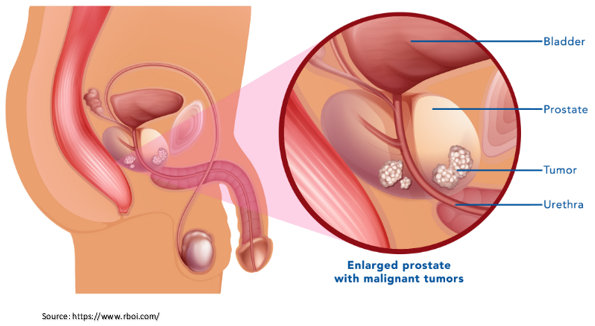
Dr. Sandeep Nayak, one of the best oncologist in India, has extensive experience detecting prostate cancer and assisting patients in determining their options. Certain risk factors put certain men at a higher risk of prostate cancer than others.
If you are concerned about prostate cancer, contact MACS Clinic to determine if you have the condition or learn more about your risk level. At MACS, we provide diagnostic tests that can discover disease evidence, such as:
- Blood tests to examine the prostate-specific antigen (PSA) levels
- Digital rectal examination (DRE)
- Analysis of family history
- Diagnostic imaging tests
If a PSA test or DRE indicates prostate cancer, a biopsy and diagnostic imaging can confirm the presence of cancer and its spread outside the prostate.
Dr. Nayak can advise you on your treatment choices if tests reveal that you may have prostate cancer.
Now, let’s know about the available,
Treatment Options for Prostate Cancer
Dr. Sandeep Nayak, a skilled surgical oncologist in India, will determine which treatment is appropriate for your case once your diagnostic tests are completed. Each has distinct therapeutic objectives and a set of treatment alternatives that are most effective in managing the disease.
There are various options for prostate cancer treatment in Bangalore, India, that can be used at different times based on the patient’s disease stage and current health.
Active Surveillance or Watchful Waiting
Prostate cancer grows slowly in many cases. Thus, early medical intervention may not be necessary. Low-grade prostate cancers can be treated with a watchful waiting or active monitoring strategy. It means that the cancer is closely watched by keeping track of the changing symptoms and doing regular tests to determine the best course of action.
Surgery
The type of surgery depends on the disease’s stage, the patient’s overall condition, and other factors.
Radical (open) prostatectomy
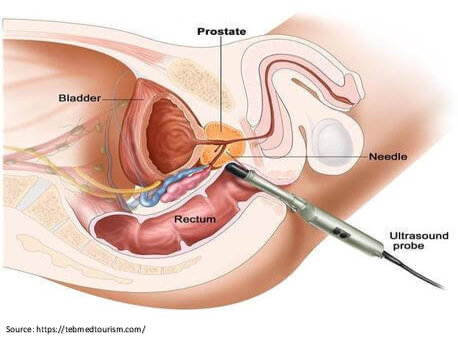
The entire prostate, as well as the seminal vesicles, are surgically removed in radical prostatectomy. It is also possible to remove lymph nodes in the pelvic area. Sexual function may be affected as a result of this procedure.
When possible, nerve-sparing surgery improves a man’s chances of maintaining sexual function following surgery by minimizing surgical injury to the nerves that control erections and orgasm.
Because these are independent processes, orgasm can occur even if some nerves are damaged. Radical prostatectomy can cause urinary incontinence. The doctor may recommend drugs, penile implants, or injections to restore normal sexual function. Urinary incontinence can sometimes be treated with another procedure.
Robotic or laparoscopic prostatectomy
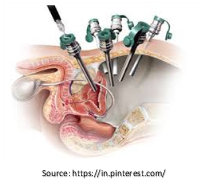
This procedure is less intrusive than a radical prostatectomy and may result in a faster recovery. The surgeon inserts a camera and tools into the patient’s abdomen through small keyhole incisions.
Then, the surgeon uses the robotic devices to remove the prostate gland. The sexual and urinary side effects of robotic prostatectomy are comparable to those of a radical (open) prostatectomy.
Bilateral orchiectomy
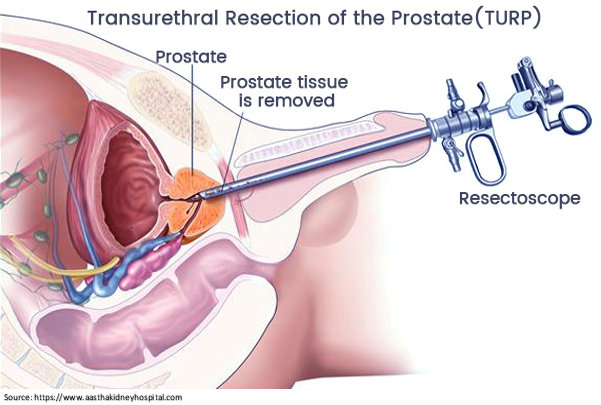
The surgical removal of both testicles is known as bilateral orchiectomy.
Transurethral resection of the prostate (TURP)
The most common reason for TURP is to ease the symptoms of a urinary blockage, not to cure prostate cancer. A surgeon inserts a small tube with a cutting device called a cystoscope into the urethra and the prostate to remove prostate tissue while the patient is under complete anaesthesia.
Life After Prostate Cancer Treatment
Prostate cancer treatment impacts the patient’s mental and emotional well-being, just as it does on their physical well-being. While a patient may be relieved to know that the treatment is over, there will be an intense worry of recurrence.
It is just as important to look for your body following treatment as it is to look after your emotions. It’s time to look after your mental health, and the following suggestions can help:
- Share your feelings with your loved ones.
- Eat a balanced diet.
- Maintain a healthy weight.
- Incorporate any physical activities into your daily routine, such as yoga, exercise, and so on.
- Vent out both positive and negative emotions.
- Keep yourself busy in activities that can distract you from your fears.
- Take some time to relax.
FREQUENTLY ASKED QUESTIONS
Can prostate cancer be 100% cured?
There is no one-size-fits-all answer to whether prostate cancer can be 100% cured, as the prognosis and treatment outcome for prostate cancer can vary greatly depending on a number of factors, including the stage and grade of the cancer, the patient’s age and overall health, and the type of treatment received.
Can prostate cancer be cured permanently?
In some cases, prostate cancer can be permanently cured through surgery or radiation therapy. The success of treatment and chances of a permanent cure depend on various factors such as the stage and grade of the cancer, patient’s age and health, and type of treatment received.
How much does treatment for prostate cancer cost?
The cost of treatment for prostate cancer can vary widely depending on a number of factors, including the type of treatment received, the patient’s insurance coverage, and where the treatment is being performed.
At what stage is prostate cancer not curable?
Prostate cancer can sometimes be curable even when it has spread beyond the prostate gland (metastasized), but the chances of a cure decrease as the cancer progresses. The specific stage at which prostate cancer is no longer considered curable can vary, but in general, if the cancer has spread to other parts of the body and is not responding to treatment, it may be considered incurable. It is important to consult with a healthcare provider to determine the best course of action for an individual’s specific case of prostate cancer.
